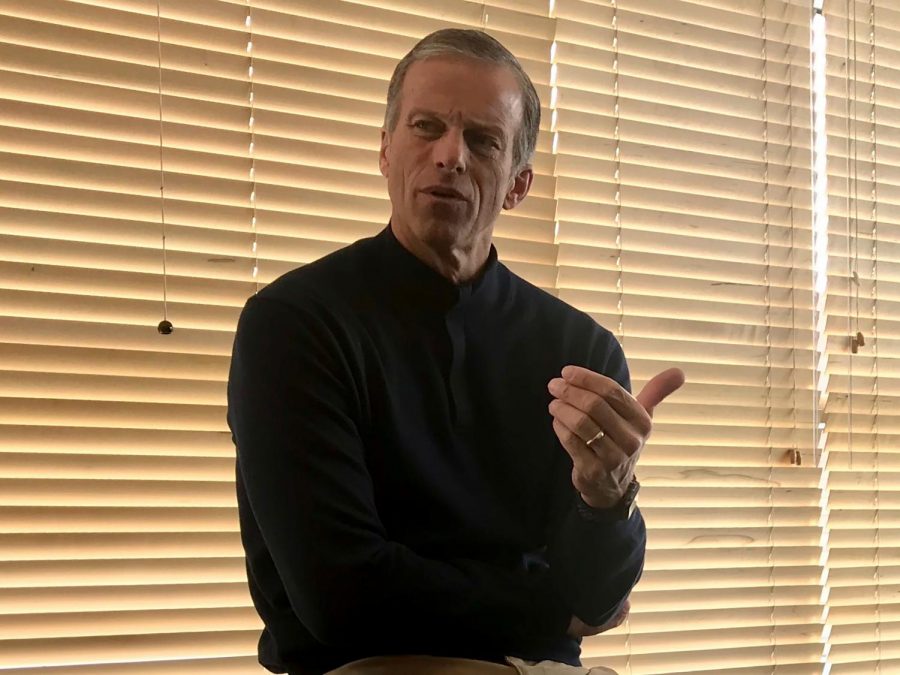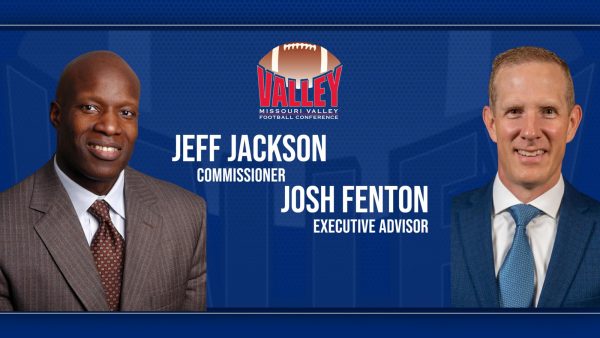Q&A with Sen. John Thune on SD agriculture
Collegian photo by Brianna Schreurs
Majority Whip Sen. John Thune, R-S.D., talks to College Republicans Feb. 21 in the Herold Crest Room in the University Student Union at SDSU.
March 20, 2019
Sen. John Thune visited South Dakota State University to discuss current issues and topics concerning the country. Sen. Thune shared a few thoughts with The Collegian about the future of agriculture for South Dakota and SDSU.
Q: Where do you see SDSU in terms of its standing in agriculture nationally?
A: SDSU has a great reputation everywhere you go, it is preparing students to go into different professions, many of which pertain directly to the profitability of agriculture. The research that gets done here is really important and we want to continue to support and provide funding for those types of programs and careers here. SDSU has a great reputation for preparing and equipping young people in a whole range of fields, many of which have a direct impact on our state’s number one industry. We want to continue that fine reputation and encourage it, and do everything we can to support that work.
Q: What do you see as the biggest problem facing South Dakota farmers?
A: Right now it’s just these chronic low prices and this sort of rut that we’re in. Inputs continue to go up. Prices stay down for a long time and so there’s no margin in agriculture right now. Probably, the biggest challenge going forward is how do we open up more markets to American agriculture and that means lowering tariff and nontariff barriers with countries like Japan and China and other areas of Asia. There’s a tremendous demand for the things that we raise and grow and we just have to get access to those markets. So, it’s about opening markets and again I come back, not only about exports and trade ,but it’s also value added agriculture, that’s ethanol, biodiesel, soybean processing, dairy all the things we can do to create jobs and economic activity as a result of the things we raise and grow here in the state.
Q: What legislation in needed to protect agriculture in South Dakota?
A: There is no substitute for a good price and farmers can make a living if they can get a return on their investment. Right now we have had low commodity prices for a long time. One of the ways that you insulate against a really down economy is with a good safety net program. In South Dakota for some time now we have had a good crop insurance program. That was a priority in this last farm bill, coupled with other safety net programs. Certainty on knowing what the rules are, making sure that farmers and lenders know that if they have a really bad year, that there is a floor under all of that, which is what crop insurance and other safety net programs do. Then it’s trade it’s opening more markets, its developing and creating new markets for renewable fuels, both biodiesel and ethanol. Using soybeans and corn extensively and any time you create more markets, create more demand, you raise the price and it makes agriculture more profitable.
Q: How do we fix the growing information gap between producers and consumers?
A: It’s always going to be a challenge because most people, when they think of the farm program, they think all of that money goes to the farmers. 80 percent of the money in the farm bill goes to the nutrition title in the farm bill, which is food stamps and different types of programs like that. Most of the support that we get in the house of representatives, for farm bills come from a lot of the larger states, who could care less about production agriculture but care about the nutrition title. We are constantly in an effort to educate members and help them understand the direct correlation between the things we do here in South Dakota and the supermarket where they buy their food. Sometimes that connection gets lost and we have to make every effort to continue to educate people on why agriculture is important even though they might not have a direct impact, they might not have a farmer or rancher in their family, or even know somebody in some parts of the country. We have a very successful and vibrant ag. economy in this country.
Q: A recent issue in South Dakota is if we should legalize industrial hemp, how do you feel about industrial hemp in South Dakota?
A: The federal farm bill this year did authorize hemp. Individual states are reacting to that now, trying to determine how they are going to proceed. The state of South Dakota is having that conversation right now. In terms of it being kind of accepted now the fact that is was included in this year’s farm bill settles that issue. How the states react in terms of the process they put in place. The concerns that have been voiced in the past, the similarities in terms of its properties make it hard for law enforcement to be able to distinguish and differentiate the two, and to enforce the law as far as marijuana is concerned. It seems like, to me, we are getting to a place where hemp, although it may look in some ways like marijuana, it has become more accepted and more mainstream and I suspect that is going to continue.






















